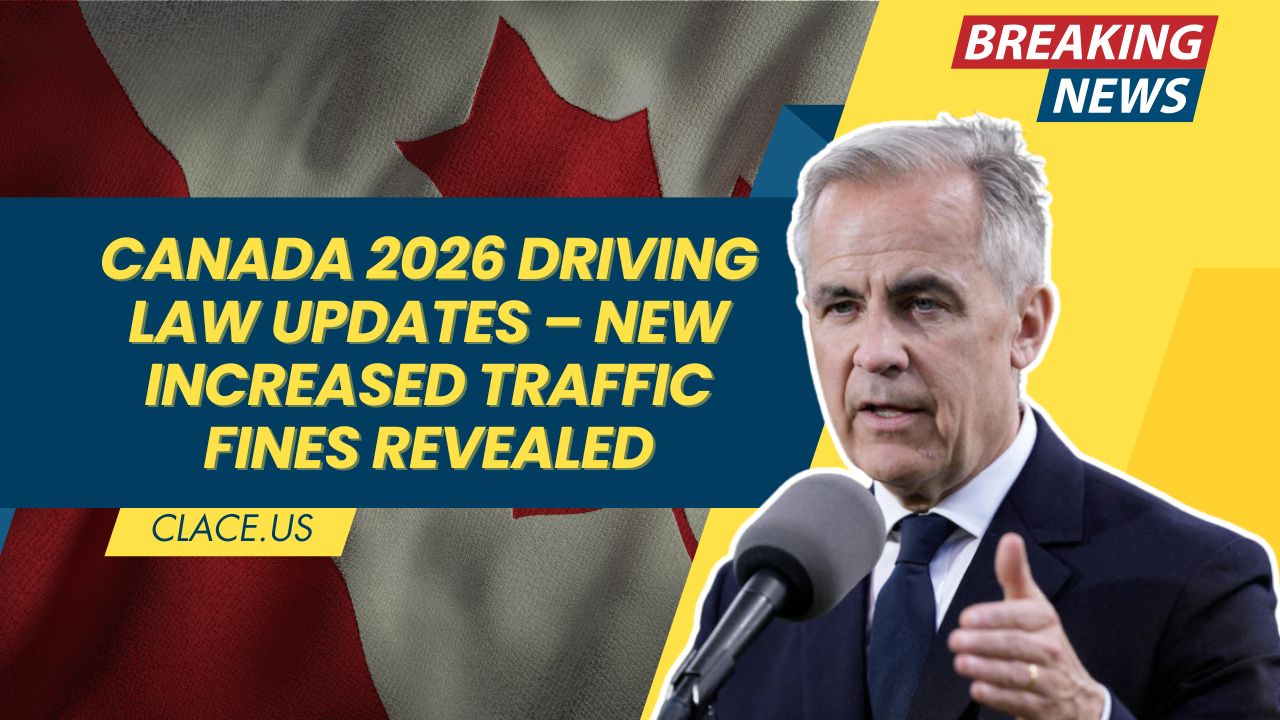Canada 2026 Driving Law Updates – New Increased Traffic Fines Revealed
The Canadian government is implementing a significant update to driving laws in 2026, introducing tougher traffic fines, stricter license penalties, and advanced technology to monitor violations. Following the 2025 reforms, this next phase reinforces the country’s mission to improve road safety and reduce traffic-related incidents nationwide.
Drivers across Canada should prepare for heightened enforcement and substantial financial consequences for violations like distracted driving, impaired driving, and speeding. The changes also mark a shift towards automated enforcement systems, promising both efficiency and consistency.
Why Are Traffic Fines Increasing in 2026?
The rationale behind the harsher traffic penalties stems from multiple public safety and enforcement challenges:
- Traffic Fatalities Remain High: Road accidents continue to be a leading cause of preventable death in Canada.
- Distracted Driving on the Rise: The growing use of smartphones behind the wheel is alarming authorities.
- Impairment by Alcohol & Cannabis: Despite cannabis legalization, impaired driving remains a major issue.
- Cost of Policing: Enforcement demands more resources and stronger deterrents.
- Aligning With Global Standards: Canada aims to match driving law benchmarks set by the EU and Australia.
How These Changes Will Affect Drivers
Financial Impact
Expect hefty fines for even minor violations, acting as a deterrent for repeat offenses.
Increased Risk of Suspension
The revised demerit thresholds will make it easier to lose your license, especially for novice drivers.
Insurance Costs
Violators could see insurance premiums spike by 20–40%, making it even more costly to drive irresponsibly.
Professional Drivers
Taxi, truck, and rideshare operators must adhere strictly to regulations or risk losing their livelihood.
Push Towards Public Transport
The steep penalties may encourage many Canadians to shift to safer and cheaper public transport options.
Key Driving Law Updates for 2026
Distracted Driving Penalties
- Fines increased to $1,200 CAD (from $800).
- 8 demerit points per offense.
- Repeat violations may lead to a 180-day license suspension.
Speeding Violations
- 40 km/h over: Fine increased to $3,000 CAD.
- 60 km/h over: Offenders may face up to 30 days in jail.
- School zones and residential areas: Double fines still apply.
Impaired Driving (Alcohol & Cannabis)
- First-time fine raised to $3,500 CAD.
- Automatic 2-year license suspension for first conviction.
- Repeat offenses could lead to permanent license revocation.
Seatbelt and Child Safety Laws
- Seatbelt fine increased to $800 CAD.
- Child restraint violations now fined at $1,200 CAD.
- Police granted broader powers for roadside checks.
Parking and Obstruction Offenses
- Urban illegal parking fines increased by 40%.
- Blocking emergency lanes results in a $2,000 CAD fine.
- Repeat offenders may face vehicle impoundment.
Demerit Point System Updates
- New drivers (G1, G2, learners): Suspension at 4 points (down from 6).
- Full license holders: Suspension starts at 10 points (down from 12).
- Suspended drivers must now attend mandatory rehabilitation programs.
Technology’s Role in 2026 Traffic Enforcement
Canada’s 2026 driving law changes lean heavily on smart technologies to monitor and enforce compliance:
- Nationwide AI Camera Deployment: Covering major highways and urban centers.
- ANPR (Automatic Number Plate Recognition): Flags uninsured or suspended vehicles in real time.
- Digital Ticketing System: Fines issued directly through online portals.
- Insurer Integration: Violations automatically reported to insurance providers, triggering premium increases.
Advantages of the 2026 Law Reforms
Despite the criticism, the reforms offer numerous advantages:
- Greater Road Safety: Aimed at reducing traffic injuries and fatalities.
- Unified Provincial Laws: Moves toward a standardized national traffic law system.
- Transparent Enforcement: Technology minimizes corruption and human bias.
- Lower Public Costs: Fewer accidents can reduce healthcare and insurance expenses.
Public Concerns and Criticism
- Disproportionate Impact on Low-Income Drivers: Fixed penalties may unfairly impact those with fewer resources.
- Limited Public Transit in Rural Areas: Stricter laws may pose challenges for rural Canadians.
- Reliability of AI Enforcement: Fear of false positives and system errors.
- Strict Novice Driver Rules: Critics say young drivers may be penalized too harshly.
Preparing for the 2026 Driving Law Changes
Here’s how to stay ahead of the reforms:
- Stay Updated: Watch for official updates and announcements.
- Drive Responsibly: Avoid distracted, impaired, or reckless driving at all costs.
- Track Demerit Points: Use available services to monitor your driving record.
- Prepare for Higher Insurance Costs: Budget accordingly if you’ve had recent violations.
- Explore Alternative Transportation: Public transit may be a cost-effective and penalty-free solution.
The Canada Driving Law Changes for 2026 mark a major leap forward in road safety and traffic enforcement. With higher fines, stricter suspension rules, and widespread use of technology, these updates are meant to curb dangerous driving behaviors and enhance the overall safety of Canadian roads.
Although the laws may seem tough, they reflect the government’s proactive stance to reduce accidents, ensure fairness in enforcement, and align with global best practices. For every driver, the path forward is clear: stay informed, drive safe, and avoid costly violations.
FAQs
The revised driving laws are scheduled to be implemented nationwide in 2026. Drivers should prepare throughout 2025.
Yes, AI-based systems and ANPR cameras will automatically detect and report violations such as speeding, no registration, and insurance lapses.
Novice drivers with learner or graduated licenses will now face license suspension at just 4 demerit points, making rule adherence more critical than ever.




